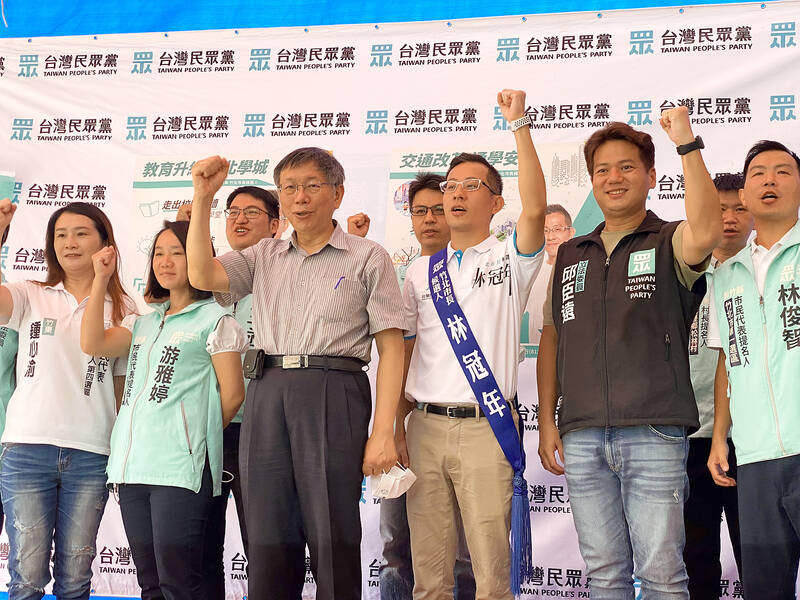Taipei Mayor Ko Wen-je (柯文哲) shows “close affinity” with an enemy state and is ignorant on defense matters, Robert Tsao (曹興誠) said after Ko criticized the tycoon’s plan to develop “civilian warriors.”
Tsao, who founded semiconductor maker United Microelectronics Corp, this month announced he would donate NT$3 billion (US$97.1 million) to bolster Taiwan’s defenses against the threat of a Chinese invasion, with plans to train civilians.
Among Tsao’s plans were NT$600 million to fund the Kuma Academy in Taipei to set up local militia units — or “black bear warriors” (黑熊戰士) — training them in combat tactics, guerrilla warfare, cognitive warfare and first aid.

Photo: CNA
Ko compared the concept of “black bear warriors” to fighters in the 1899-1901 Boxer Rebellion during late stages of China’s Qing Dynasty.
The rebellion was a movement of militia groups who sought to expel outsiders, but this led to more foreign troops being sent to China and a ruinous war, Tsao said.
Some of the Boxer groups believed they were impervious to bullets and other means of attack.
Ko said that the irrational beliefs of Boxer soldiers and their slogans calling for foreigners to be expelled were useless, and questioned the proposal to train “black bear warriors,” asking where the weapons and ammunition would come from.
“It is sad for Taiwan that the mayor of its capital city is so ignorant, lacking understanding about military defense,” Tsao said.
“Mayor Ko has mocked our programs to create a civilian defense network, to defend Taiwan from China. He calls them useless,” Tsao said. “He has shown he has a close affinity for the enemy state and works to undermine the will of Taiwanese to defend the nation, to fight against the Chinese military.”
“It is unbelievable that Ko would compare black bear warriors to Boxer militants,” Tsao said.
“People should know that the Chinese Boxers were uneducated rural people swayed by religious leaders to take up arms,” he said. “They killed foreigners in China, prompting worldwide condemnation and leading to an eight-nation alliance that invaded China to rescue their compatriots.”
“Mayor Ko’s comparison shows his ignorance and malicious intent,” he said. “In his mind, it would be useless for Taiwan’s military and civilians to resist a Chinese invasion.”

Taiwanese can file complaints with the Tourism Administration to report travel agencies if their activities caused termination of a person’s citizenship, Mainland Affairs Council Minister Chiu Chui-cheng (邱垂正) said yesterday, after a podcaster highlighted a case in which a person’s citizenship was canceled for receiving a single-use Chinese passport to enter Russia. The council is aware of incidents in which people who signed up through Chinese travel agencies for tours of Russia were told they could obtain Russian visas and fast-track border clearance, Chiu told reporters on the sidelines of an event in Taipei. However, the travel agencies actually applied

New measures aimed at making Taiwan more attractive to foreign professionals came into effect this month, the National Development Council said yesterday. Among the changes, international students at Taiwanese universities would be able to work in Taiwan without a work permit in the two years after they graduate, explainer materials provided by the council said. In addition, foreign nationals who graduated from one of the world’s top 200 universities within the past five years can also apply for a two-year open work permit. Previously, those graduates would have needed to apply for a work permit using point-based criteria or have a Taiwanese company

The Shilin District Prosecutors’ Office yesterday indicted two Taiwanese and issued a wanted notice for Pete Liu (劉作虎), founder of Shenzhen-based smartphone manufacturer OnePlus Technology Co (萬普拉斯科技), for allegedly contravening the Act Governing Relations Between the People of the Taiwan Area and the Mainland Area (臺灣地區與大陸地區人民關係條例) by poaching 70 engineers in Taiwan. Liu allegedly traveled to Taiwan at the end of 2014 and met with a Taiwanese man surnamed Lin (林) to discuss establishing a mobile software research and development (R&D) team in Taiwan, prosecutors said. Without approval from the government, Lin, following Liu’s instructions, recruited more than 70 software

Chinese spouse and influencer Guan Guan’s (關關) residency permit has been revoked for repeatedly posting pro-China videos that threaten national security, the National Immigration Agency confirmed today. Guan Guan has said many controversial statements in her videos posted to Douyin (抖音), including “the red flag will soon be painted all over Taiwan” and “Taiwan is an inseparable part of China,” and expressing hope for expedited reunification. The agency last year received multiple reports alleging that Guan Guan had advocated for armed reunification. After verifying the reports, the agency last month issued a notice requiring her to appear and explain her actions. Guan